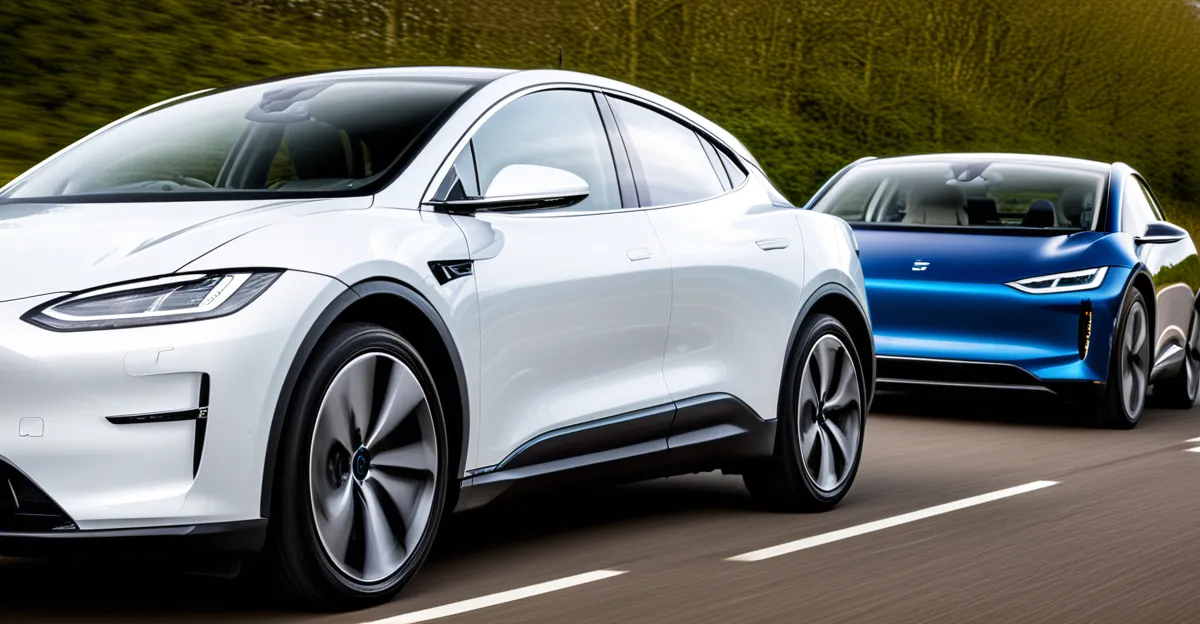Transformative Impact of Electric Vehicles on UK Automotive Industry
Electric vehicles UK have profoundly accelerated the automotive industry transformation across the nation. One of the most significant shifts is in manufacturing processes, moving away from traditional internal combustion engine production toward electric drivetrains. This paradigm shift demands new skills and retools factories to accommodate electric vehicle components like motors and sophisticated battery systems.
Changes in market demand and consumer behaviour are equally impactful. Increasing environmental awareness and government incentives have spurred higher EV adoption UK-wide, prompting automakers to diversify their portfolios and prioritize electric models to meet evolving preferences. Consumers now expect sustainable, efficient vehicles without compromising performance, which drives innovation further.
Also to discover : What are the opportunities for growth in the UK automotive sector?
Government policies and regulations also play a pivotal role. The UK’s robust zero-emission commitments incentivize manufacturers and consumers alike, enabling a smoother transition within this transformative phase. These frameworks support initiatives like EV grants, infrastructure investment, and emissions targets, aligning the automotive industry’s future with sustainability goals.
Together, these factors underscore a comprehensive transformation where technological advancement, market evolution, and policy frameworks converge, positioning the UK as a frontrunner in the electric vehicle revolution.
In the same genre : How are UK automotive firms adapting to changing consumer preferences?
Impact on Manufacturing and Supply Chains
The shift to EV manufacturing UK represents a fundamental change in automotive industry transformation. Traditional production lines focused on internal combustion engines are being reengineered for electric drivetrains, requiring precision in assembling electric motors, power electronics, and battery packs. This transition drives the need for new manufacturing techniques and quality control measures tailored specifically to EV components.
A critical element is the supply chain transformation centered on sourcing and producing EV batteries. The UK aims to secure sustainable battery supply chains to reduce dependency on international sources, encouraging local development of battery cell manufacturing and recycling capabilities. This creates opportunities for innovation and integration with emerging technologies such as solid-state batteries.
Automotive innovation UK flourishes within this evolving landscape. Collaborations between manufacturers, tech firms, and research institutions enable rapid advancements and cost reductions. These partnerships foster UK-based expertise and strengthen local capabilities, aligning closely with government incentives targeting EV adoption UK. Thus, supply chain resilience and technological progress go hand in hand in shaping the future of electric vehicle production in the UK.
Employment and Workforce Adaptation
The shift to electric vehicles UK profoundly reshapes automotive jobs UK, requiring significant workforce adaptation. Traditional roles focused on internal combustion engines decline while new positions emerge around electric drivetrain assembly, battery management, and software integration. This change demands a substantial EV workforce transition.
How is the UK automotive sector addressing these workforce challenges? The answer lies in extensive reskilling in the automotive industry programs. Industry and government initiatives collaborate to provide targeted training, equipping employees with skills in battery technology, electric motor assembly, and vehicle electronics. These efforts ensure workers can transition smoothly, maintaining employment levels amid the industry transformation.
Moreover, the evolving EV manufacturing landscape affects ancillary sectors, such as parts suppliers and maintenance services, prompting reskilling beyond direct manufacturing roles. Workforce development focuses on future-proofing skills to sustain the UK’s competitive edge in the evolving automotive market.
In summary, the UK automotive industry’s response involves proactive reskilling strategies, workforce realignment, and education. This comprehensive adaptation supports a just transition for workers during the ongoing automotive industry transformation driven by rising EV adoption UK.
Charging Infrastructure and Technology Challenges
The rapid growth of EV charging UK highlights the critical need for robust charging infrastructure development. Expanding reliable and accessible charging networks across urban and rural areas is essential to support rising demand driven by increasing electric vehicles UK adoption. Public and private investments focus on fast-charging stations, improving user experience and reducing “range anxiety” among drivers.
Advances in battery technology UK enhance vehicle range and charging times, yet limitations remain. Current lithium-ion batteries face challenges in energy density, cost, and longevity that slow widespread EV uptake. Researchers explore alternatives, including solid-state batteries, aiming to improve performance and sustainability—key to sustaining the ongoing automotive industry transformation.
Integrating charging infrastructure with renewable energy sources and smart grid systems represents a strategic priority. Combining solar or wind generation with EV charging can reduce environmental impact and energy costs. Smart grids optimize electricity distribution, responding dynamically to demand peaks, benefiting both consumers and the grid’s stability.
Overall, the synchronization of charging infrastructure, battery innovation, and clean energy integration underpins the UK’s commitment to accelerating EV adoption UK while addressing technological and environmental challenges.
Environmental Impact and Government Policies
The electric vehicles UK revolution significantly advances the country’s environmental goals. With the rise in EV adoption UK, carbon emissions and urban air pollution have begun to decline, showcasing the clear EV environmental benefits UK. Electric vehicles produce zero tailpipe emissions, contributing to improved air quality and reduced greenhouse gases, crucial for meeting the UK’s climate commitments.
Government intervention remains a critical driver in this transformation. The UK’s zero emissions policies UK include ambitious targets to phase out petrol and diesel cars by 2030 while providing robust incentives to encourage consumers to switch to electric. These UK EV incentives—such as purchase grants and tax reductions—lower barriers and accelerate market uptake.
To ensure progress, environmental standards and emission reductions are continuously monitored and benchmarked, ensuring industries adhere to regulatory expectations. This strategic alignment between policy and environmental impact helps sustain momentum in automotive industry transformation, fostering a cleaner, sustainable transport future in the UK. Continued government support and enforcement of policies are essential for maintaining growth in electric vehicles UK adoption and ensuring long-term environmental benefits.
Real-World Examples from UK Automakers
Delving into UK electric car manufacturers reveals clear approaches shaping the automotive industry trends UK. Leading firms prioritize electrification strategies, balancing innovation with market demands to accelerate EV adoption UK. For instance, several British automakers have developed all-electric models featuring advanced battery management and lightweight designs, addressing consumer expectations for range and performance.
Notable British EV case studies illustrate success in integrating cutting-edge technology with manufacturing agility. These case studies highlight how collaboration between OEMs and tech startups fosters rapid development of EV components, especially batteries and power electronics. Such partnerships enhance local supply chains, reducing costs and improving efficiency.
Market response to UK manufacturers’ electric vehicles demonstrates pragmatic consumer acceptance alongside enthusiasm for sustainable mobility. Lessons learned emphasize the importance of supportive infrastructure and competitive pricing. Moreover, these examples reflect the broader automotive industry transformation driven by evolving consumer preferences and regulatory frameworks.
In summary, real-world implementation by UK electric car manufacturers evidences a dynamic sector adapting to the electric revolution. Their experiences underscore critical factors—innovation, collaboration, and market alignment—that continually influence the UK’s EV landscape.





